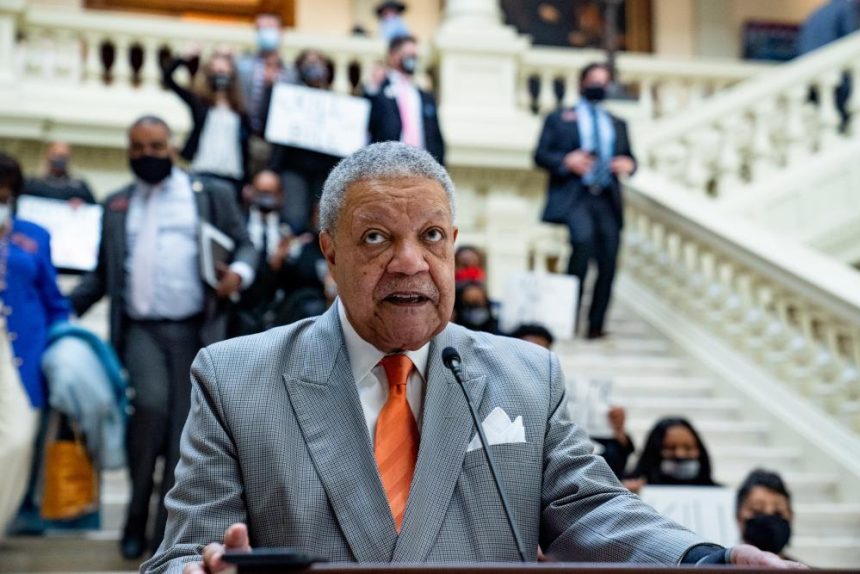The Fulton county commission in Georgia will be fined $10,000 a day for violating a court order to appoint two Republicans associated with Trump-aligned groups pushing voter fraud conspiracies to the county’s election board.
The county charter states that commissioners “shall” appoint two Republicans and two Democrats nominated by their respective county party chairperson, for two-year terms. When commissioners rejected the nomination by Fulton county’s Republican party chair, the superior court judge David Emerson issued an order requiring the board to appoint them.
In a civil contempt case that threatened jail time, Emerson found the Democratic commissioners have “been stubbornly litigious and acted in bad faith in its conduct prior to this litigation by its failure to comply with clear local legislation which forced the plaintiff to file this action,” Emerson’s ruling Wednesday states. Emerson awarded attorney’s fees to the Republican plaintiffs.
Related: Democrat flips Iowa state senate seat and breaks Republican supermajority
The plaintiffs were seeking an order of both civil and criminal contempt for failing to comply with the order. Civil contempt has historically meant an ever-increasing series of daily fines until the board complies with the order. But a finding of criminal contempt would have meant jail time until enough Democratic commissioners agree to vote for the appointment.
The Fulton county Republican party chair, Stephanie Endres, nominated Jason Frazier for a term and renominated Julie Adams to serve another term.
Frazier is among the most prolific challengers of voter registrations in Georgia, and unsuccessfully sued Fulton county in federal court in 2024, attempting to force the board of registration and elections to purge nearly 2,000 Fulton county voters from the state’s rolls before the presidential election.
Adams is a member of an election-denial activist network founded by Cleta Mitchell, a Trump ally who aided his efforts to overturn the election in Georgia and elsewhere. As a member of the Fulton county board of registration and elections, Adams refused to certify the May 2024 primary, which led to a Fulton county court case that ultimately compelled her to affirm the election.
That case loomed large in court today. The court in Adams v Fulton county held that the act of certification was ministerial – a requirement, not a choice – because of the language in the law, noted Thomas L Oliver III, an attorney for the Republicans.
Facing the court’s order, Adams ultimately complied, Oliver said. “Now they want to be on the other side of that argument. It’s pretty rich,” he added.
In a previous ruling, Emerson said: “The court finds that the ‘shall’ as used here is mandatory, and the [board of commissioners] does not have discretion to disapprove an otherwise qualified nominee.” Emerson cited the mandatory nature of the language in the Adams case as applicable to the commissioners as well.
Don Samuel, the county’s attorney, argued that the commissioners were refusing to complete the appointment because they were hoping to overturn the lower court’s order on appeal, and making the appointment would render an appeal moot. The ministerial function implicit in the language of the law of an elected official and an appointed official is a legal distinction for the appellate court, he said.
“They are not defying this court out of disrespect of this court in any way,” Samuel said, acknowledging how their refusal to comply with the order looked in light of Democratic arguments about federal administration officials’ defiance of court orders. “We can’t help but read in the paper about the defiance of the judiciary,” he said. “We are not, despite the plaintiff’s overbroad argument here, we are not in defiance of the order. We’re trying to protect our rights in appeal.”
Fulton county has seven elected commissioners, five of whom are Democrats. The lawsuit only named those five: Dana Barrett, Mo Ivory, Khadijah Abdur-Rahman, Marvin Arrington and chair Robb Pitts. Pitts, Abdur-Rahman and Arrington did not vote on the appointment, leaving Barrett and Ivory to vote against it for a 2-2 tie.
Social media messages from Ivory and Barrett were presented in court, in which the two Democrats pledged not to make the appointment.
“Those who oversee elections must be fully independent and accountable,” Ivory said on Instagram.
“No judge can compel any elected official to vote in any way,” said Barrett, also on Instagram. “Our elections are under attack in this country … This is just another arena where they’re trying to chip away at free and fair elections.”
The law governing appointments to election boards in Georgia is an inconsistent patchwork. In neighboring Dekalb county, the chief judge of the county’s superior court is the appointment authority. Earlier this year, the judge allowed one controversial Republican nominee to be appointed while denying another. In Republican-controlled Cherokee county, an affluent northern suburb of Atlanta, county commissioners rejected the nomination of the county’s Democratic party to the election board, opting instead to find a Democrat they preferred to serve.













